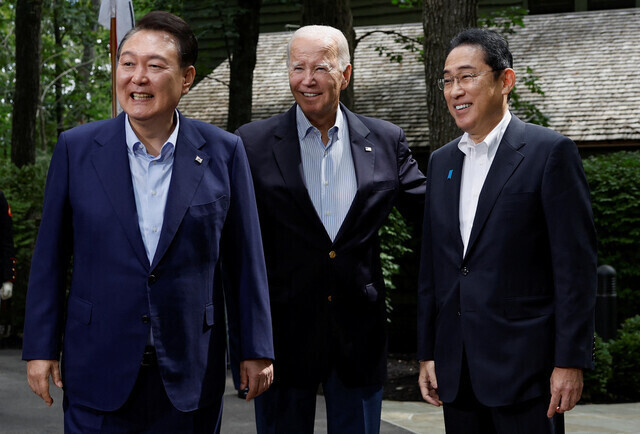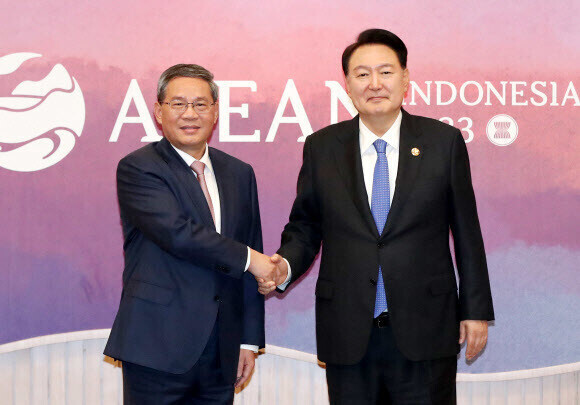hankyoreh
Links to other country sites 다른 나라 사이트 링크
To balance between US and China, S. Korea must choose alignments and oppositions according to issue, says scholar

When it comes to the US and China, South Korea should put forth a balanced foreign and security policy through “different alignments and oppositions” on issues rather than take sides, advised Graham Allison, a former dean of the Harvard Kennedy School and US assistant secretary of defense, in an interview with the Hankyoreh on Wednesday.
Our interview comes ahead of Allison’s presentation at the Asia Future Forum on Oct. 11, hosted by the Hankyoreh and organized by the Hankyoreh Economy and Society Research Institute.
Allison also predicted that South Korea would be part of a “multi-dimensional balance of power.”
Those interested in hearing the particulars of Allison’s insights into what choices Korea — reliant on the US for security and China for its economy — should make amid the heated hegemonic rivalry between the US and China are invited to attend the forum.
Hankyoreh: In an interview with a South Korean media outlet, you said that it is very important for South Korea to balance its security and economic interests with those of the United States and China. While this is the case, doing so is becoming more difficult.
Graham Allison: The reason for this is that the conflict between the US and China has escalated into a trade conflict, which has shaken the balance of economic interests that South Korea has had with China since China’s opening up. It’s becoming more difficult to balance these two interests, security and economy, and I'm wondering what the best options and strategies South Korea has in this environment.
South Korea is a modern miracle: Despite the threats from North Korea and despite provocations from North Korea, South Koreans have seen more improvement in their well-being than in any other seven decades in their history. Americans are proud to have played a part in creating the environment in which this was able to take place, serving as South Korea’s primary security partner. What South Korean President Yoon did in the Washington Declaration was just the most recent example of this decades-long partnership.

Yet while South Korea’s security depends on the US, its prosperity undoubtedly depends on China, which is its largest trading partner. While there will be those who claim South Korea needs to choose one or the other, we do not live in a black-and-white world, but instead one that forces us to become accustomed to 50 shades of alignment and opposition.
The way that South Korea balances this will be through different alignments and oppositions, depending on the issue at hand. So while the US tries to cope with China by constructing a stronger network of allies, they understandably want to strengthen ties with South Korea. And as China grows more powerful, it undoubtedly is a larger threat to South Korea. But given this economic reliance, they won’t ever fully align against China, which is why they are not a member of the Quad, for instance. Instead, they’ll be part of a multi-dimensional balance of power. In some dimensions, you'll have very thick partnerships between two parties who will be serious rivals in other areas.

Hankyoreh: The current administration has been strengthening diplomacy between South Korea, the United States and Japan. There is a stronger trilateral cooperation system than at any time in the past few decades. Sometimes, our relationship with China creates unnecessary misunderstandings. When it comes to North Korea, we are confronting them on the principle of strength and power rather than cooperation and dialogue. What are your thoughts and assessments on these aspects of South Korea’s diplomacy and foreign policy?
Allison: South Korea is forced to try to continue surviving next door to a very erratic and sometimes seemingly irrational North Korea that has an increasingly robust nuclear arsenal as well as a million-man army. The regime is increasingly able to threaten even the United States. Living beside Kim Jong-un and the North Korean regime has been very challenging for South Korea for 70 years and is likely to become more challenging in the period ahead.
Yet the emerging balance of power in Asia is also something on Yoon’s radar. We saw this in the recent meeting at Camp David between Japan, South Korea, and the US. The tides are shifting and, given the challenge and threat posed by China, the security interests of these three countries are increasingly converging. Yet despite increasing commonality, divergent views on the economic benefits and security risks from China will remain; that’s why we’re going to see in Asia this emerging, multi-dimensional balance of power with different alignments and oppositions along different dimensions.
By Ryu Yi-geun, senior staff writer at the Hankyoreh Economy and Society Research Institute
Please direct questions or comments to [english@hani.co.kr]

Editorial・opinion
![[Column] Tariffs on China: Trump was dumb, Biden dumber [Column] Tariffs on China: Trump was dumb, Biden dumber](https://flexible.img.hani.co.kr/flexible/normal/500/300/imgdb/original/2024/0520/191716191153918.jpg) [Column] Tariffs on China: Trump was dumb, Biden dumber
[Column] Tariffs on China: Trump was dumb, Biden dumber![[Column] What if Seoul took reunification by force off the table? [Column] What if Seoul took reunification by force off the table?](https://flexible.img.hani.co.kr/flexible/normal/500/300/imgdb/original/2024/0520/3017161928630494.jpg) [Column] What if Seoul took reunification by force off the table?
[Column] What if Seoul took reunification by force off the table?- [Editorial] Intensifying US-China rivalry means Seoul must address uncertainty with Beijing sooner than later
- [Column] When ‘fairness’ means hate and violence
- [Editorial] Yoon must stop abusing authority to shield himself from investigation
- [Column] US troop withdrawal from Korea could be the Acheson Line all over
- [Column] How to win back readers who’ve turned to YouTube for news
- [Column] Welcome to the president’s pity party
- [Editorial] Korea must respond firmly to Japan’s attempt to usurp Line
- [Editorial] Transfers of prosecutors investigating Korea’s first lady send chilling message
Most viewed articles
- 1Xi, Putin ‘oppose acts of military intimidation’ against N. Korea by US in joint statement
- 2For new generation of Chinese artists, discontent is disobedience
- 3[Editorial] Transfers of prosecutors investigating Korea’s first lady send chilling message
- 4[Column] When ‘fairness’ means hate and violence
- 5[Editorial] Intensifying US-China rivalry means Seoul must address uncertainty with Beijing sooner t
- 6How K-pop broke the internet — and broke into the US market
- 7[Exclusive] Unearthed memo suggests Gwangju Uprising missing may have been cremated
- 8‘Shot, stabbed, piled on a truck’: Mystery of missing dead at Gwangju Prison
- 9Naver to acquire Canada’s Wattpad to fuel its IP ambitions
- 10AI, robots won’t free us from work - they’ll make our jobs worse